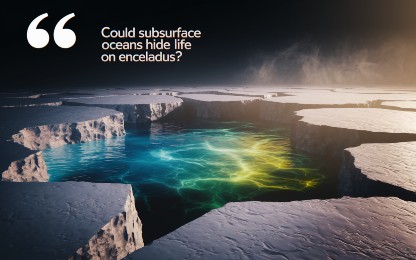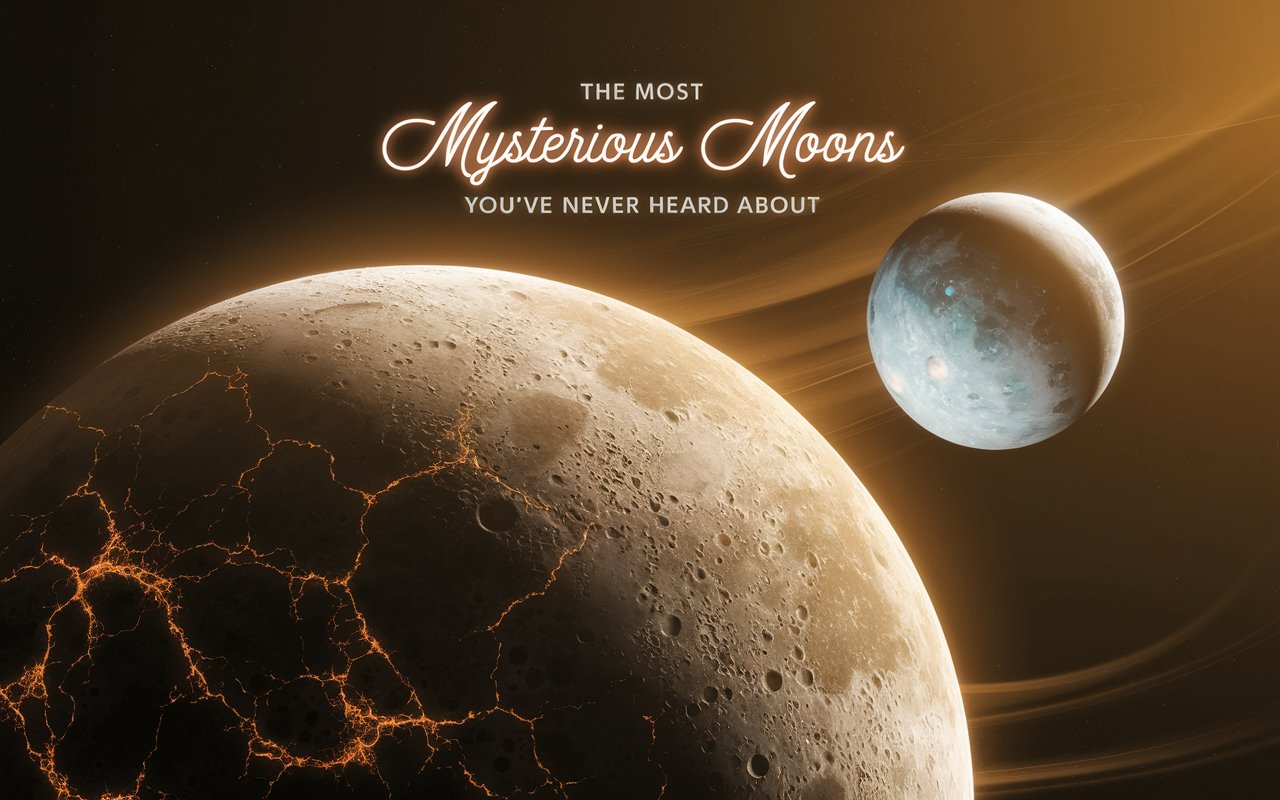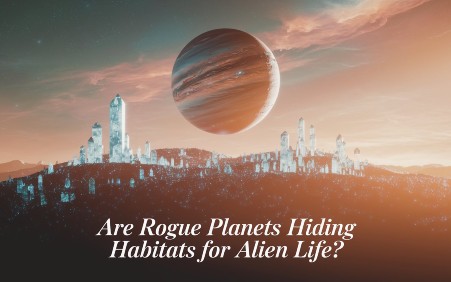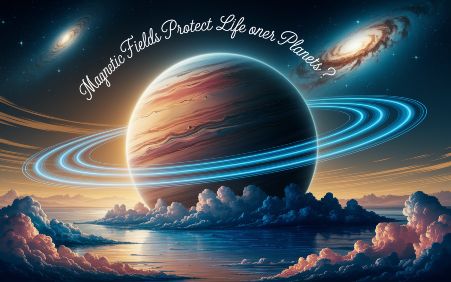Scientists continue to ask one big question. Could subsurface oceans hide life on Enceladus? This small icy moon of Saturn may hold answers. Its hidden oceans might be home to simple organisms. This topic excites astrobiologists and researchers worldwide. Clues from NASA missions suggest something incredible. A hidden world might exist beneath Enceladus’ frozen crust.
What Makes Enceladus Special?
Enceladus is not the biggest moon. It is only about 500 kilometers wide. Yet it shows something rare. It sprays water vapor into space. These plumes shoot from its south pole. They reveal a subsurface ocean. Scientists ask again. Could subsurface oceans hide life on Enceladus?
Water Means Possibility
Life needs water. Enceladus has it. That makes it interesting. It may host tiny life forms. Warmth from tidal forces keeps water liquid. No sunlight is needed. This unique condition makes the question important. Could subsurface oceans hide life on Enceladus?
Geysers from the Surface
The Cassini spacecraft gave vital proof. It flew through icy plumes. These geysers carry water and particles. Some contain complex molecules. These include methane and hydrogen. Both may feed microbes. Scientists now study this closely. Could subsurface oceans hide life on Enceladus?
Conditions That Support Life
Enceladus checks many boxes for life. It has water. It has energy. It has organic material. These three ingredients matter. They support microbial life on Earth. They might do the same there. So again we ask. Could subsurface oceans hide life on Enceladus?
Energy from Tidal Heating
Tidal forces stretch Enceladus. Saturn’s gravity pulls it constantly. This generates heat. Heat keeps the ocean liquid. It also creates hydrothermal vents. These vents on Earth host life. They do not need sunlight. Could subsurface oceans hide life on Enceladus using similar vents?
Organic Molecules in Plumes
Cassini found organics in the plumes. These include carbon-based molecules. Some resemble amino acids. They might be building blocks of life. These findings excite scientists. Such material adds to the mystery. Could subsurface oceans hide life on Enceladus with these building blocks?
Exploration and Discoveries
Cassini orbited Saturn for many years. It passed Enceladus many times. It flew through its plumes. It collected samples. The data it sent amazed scientists. They still study it today. All evidence points to one mystery. Could subsurface oceans hide life on Enceladus?
What Cassini Proved
Cassini proved many things. The plumes come from a deep ocean. The ocean has salt. It also has organic molecules. These facts support a big idea. Enceladus could support microbial life. It is not just a frozen moon. Could subsurface oceans hide life on Enceladus in salty water?
Similarity to Earth Conditions
Earth has hydrothermal vents. These vents host strange life. No sun is needed. Just heat and minerals. Enceladus might have similar vents. If so microbes may thrive. Life on Earth proves this. Could subsurface oceans hide life on Enceladus in the same way?
Future Missions to Enceladus
New missions may explore Enceladus. NASA and ESA plan such trips. They want to sample the plumes. No need to land. Plumes release ocean water into space. This saves cost and risk. Could subsurface oceans hide life on Enceladus? These missions aim to find out.
Why Sampling the Plumes Matters
Sampling plumes is easy. Spacecraft can fly through them. They collect water and dust. Instruments then study the contents. This gives a direct test. Could subsurface oceans hide life on Enceladus? Scientists hope to answer this with fresh samples.
Potential Instruments on Board
Future missions will carry advanced tools. They may use mass spectrometers. They may detect amino acids. They may spot microbial structures. The goal is clear. Could subsurface oceans hide life on Enceladus? Instruments must deliver strong proof.
Challenges of Exploration
Enceladus is far. It orbits Saturn. Travel takes many years. Building spacecraft is costly. Missions need funding and support. But the reward is huge. We could find alien life. Could subsurface oceans hide life on Enceladus? It is worth the effort.
Harsh Environment of Enceladus
It is icy. Temperatures stay below minus 200 degrees. Instruments may freeze. Plumes may be thin. Orbiting Saturn adds radiation risks. Yet exploration continues. Could subsurface oceans hide life on Enceladus despite the cold?
Cost and Time Factors
Missions take time. Designing and testing takes years. Flying there takes longer. Cassini took seven years to reach Saturn. Plume missions need patience. Could subsurface oceans hide life on Enceladus? The question deserves time and investment.
Pros and Cons of Exploring Enceladus
| Pros | Cons |
|---|---|
| High chance to find simple life forms | Missions are expensive |
| Water plumes easy to sample | Travel time is long |
| Strong scientific interest | Instruments may face harsh weather |
| Evidence from Cassini is promising | Limited data may create false hope |
| Could answer age-old life questions | Requires international cooperation |
Could Subsurface Oceans Hide Life on Enceladus? The Scientific Debate
Not all scientists agree. Some say the evidence is weak. Others say it is strong. This debate is healthy. It fuels research. It sharpens questions. Could subsurface oceans hide life on Enceladus? The question remains open but exciting.
Doubts About Microbial Life
Some say heat may not be enough. Others argue against enough organics. Some doubt the ocean’s age. They think it is too young. Could subsurface oceans hide life on Enceladus despite these concerns?
Optimism from Earth Analogs
Earth shows life is tough. It thrives in extreme places. Deep oceans host strange life. Antarctica holds microbes in ice. Could subsurface oceans hide life on Enceladus if life is this resilient?
Broader Impact on Science
Finding life changes everything. It shifts our place in the universe. It shows life is not unique. It affects biology and philosophy. Could subsurface oceans hide life on Enceladus? If yes it reshapes science forever.
Changing How We Define Life
Life on Earth follows carbon rules. Alien life may be different. Studying Enceladus might expand our ideas. Life may be broader than we think. Could subsurface oceans hide life on Enceladus and redefine biology?
Encouraging Future Exploration
Enceladus inspires missions. It makes space research exciting. Students study science because of it. NASA gains support. Could subsurface oceans hide life on Enceladus? That question fuels a new space era.
Frequently Asked Questions
What is Enceladus?
It is a small icy moon of Saturn. It has water geysers and a hidden ocean.
Why is Enceladus important?
It may host alien life. It has liquid water and organic material below its icy crust.
How did Cassini help?
Cassini flew through the geysers. It found signs of salt and organics in the ocean water.
Could subsurface oceans hide life on Enceladus?
Yes. The moon has key life ingredients like water heat and organic molecules.
Will we send more missions?
Yes. NASA and others plan new missions. These will sample geysers again for signs of life.
Final Thoughts
The mystery remains strong. Could subsurface oceans hide life on Enceladus? We do not know yet. But all signs suggest it is possible. Water is there. Heat is there. Organics are there. Life may be too. Future missions will explore deeper. The answer may change how we see the universe. Keep asking. Keep exploring. The search continues.





